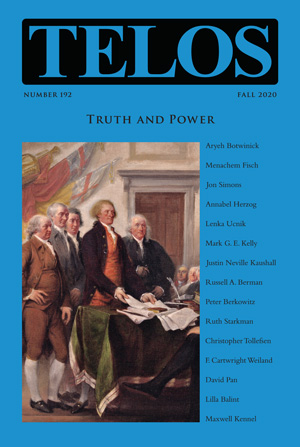Aryeh Botwinick’s “Negative Theology, Power, and the Israeli–Palestinian Conflict” appears in Telos 192 (Fall 2020): Truth and Power. Read the full article at the Telos Online website, or purchase a print copy of the issue in our online store. Individual subscriptions to Telos are available in both print and online formats.
 From a Machiavellian perspective, peace is war by other means. You can have a much greater watchful vigilance of your former (or future) opponent in times of peace than in a time of war. Israel as a sponsor (or co-sponsor) of a kind of Middle East Marshall Plan: Rebuilding your enemy so that he becomes your ally and friend. Enemies must learn to use each other’s weapons. The weakness of the Palestinians has to be matched by the deliberate, self-consciously generated weakness of the Israelis in the form of benevolence and generosity in order for both sides to emerge as triumphant. If this approach is pursued, the Israeli–Palestinian conflict harbors the prospect of turning into a sum-sum conflict, where both sides stand equally to gain by pursuing peace.
From a Machiavellian perspective, peace is war by other means. You can have a much greater watchful vigilance of your former (or future) opponent in times of peace than in a time of war. Israel as a sponsor (or co-sponsor) of a kind of Middle East Marshall Plan: Rebuilding your enemy so that he becomes your ally and friend. Enemies must learn to use each other’s weapons. The weakness of the Palestinians has to be matched by the deliberate, self-consciously generated weakness of the Israelis in the form of benevolence and generosity in order for both sides to emerge as triumphant. If this approach is pursued, the Israeli–Palestinian conflict harbors the prospect of turning into a sum-sum conflict, where both sides stand equally to gain by pursuing peace.
Asymmetricality generally needs to be perceived as a diagnostic tool—rather than as a prescriptive tool. When you notice that the resources arrayed on one side of a conflict are asymmetrical in relation to the resources being mobilized on the other side of a conflict, when, for example, your nation embarks on a policy of deliberately mobilizing and displaying superior force in order to expedite victory over a pronouncedly inferior nation, then, after an initial time-limited period where one strives to assess whether one’s opponent can attack or fight on the same level that one’s own nation is attacking or fighting, one has to reintroduce symmetry in order for each side to have a better chance of prevailing against the other. A fox has to be fought with fox-like tactics; similarly, a lion has to be contained through a lion-like build-up of armaments on the other side, satisfying the conditions of deterrence. Weakness has to be combatted by an equally effective form of weakness, so that the asymmetrical advantage achieved by the first nation’s display of weakness can be neutralized. Military weakness must be met with generosity in order to equalize the confrontation. Otherwise, you end up with South Africa or Vietnam—where the winner turns loser and the loser turns winner.
From a Machiavellian perspective, success and failure—military and political victory and military and political defeat—are always poised to become their dialectical opposite numbers unless they are approached with the subtlety of the dialectician, fully aware of the fluidity and interchangeability of military and political outcomes—indeed, of virtually all life outcomes.









In your recent article in you also stated:
” Machiavellian political thought is formulated in an idiom of approximation and not in a idiom of certainty. Nothing is known for sure–neither what is happening in the world (all of the factors at work in any given political and military situation) nor how to respond to it. The gap between what the political actor is seeking to learn and master and the objects of the search is infinite. The uncertainly surrounding political deliberation and action is without end–but the imperative to act is equally unrelenting and infinite.”
I am profoundly thankful to you for developing this theme of uncertainty (in all its many dimensions) throughout the many articles you have written for Telos. Way back in 2005 in Telos 132 you wrote an article entitled “Same/Other versus Friend/Enemy Levinas Contra Schmitt,” which I have reread so often that I think almost every sentence us underlined!
My own “intoxication with certainty” has been at least somewhat contained due to your brilliant insights.